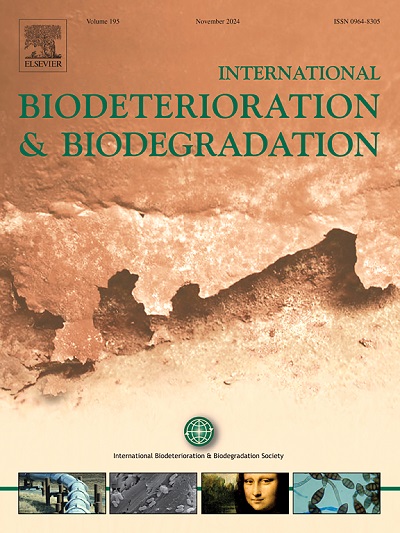Biodegradation of polyurethane plastic monomer 4,4′-methylenedianiline by Rhodococcus sp. YXP8
IF 4.1
2区 环境科学与生态学
Q2 BIOTECHNOLOGY & APPLIED MICROBIOLOGY
International Biodeterioration & Biodegradation
Pub Date : 2025-06-07
DOI:10.1016/j.ibiod.2025.106135
引用次数: 0
Abstract
The 4,4′-methylenedianiline (MDA) is an important precursor in the production of polyurethane plastic. The environmental release of MDA poses a threat to plants, animals, and humans. Microorganisms exert an important role in degrading xenobiotic compounds. However, only several MDA-degrading microbes are reported, and the molecular mechanism of MDA degradation remains unclear. In this work, a Gram-positive MDA-degrading bacterium Rhodococcus sp. YXP8 was first obtained from the surface of polyurethane waste. This strain could degrade 20 mg·L−1 MDA at 30 °C and pH 7.0 within 4 days and showed good degradation ability (>70 %) within a wide pH range from 5.0 to 10.0. The results of liquid chromatograph-tandem mass spectrometer analysis indicate that strain YXP8 transformed MDA to two final products of 4-aminophenylacetic acid and (Z)-3-amino-2-hydroxypenta-2,4-dienoic acid. The catabolic pathway of MDA in bacteria was demonstrated for the first time. Strain YXP8 could efficiently remediate MDA-contaminated natural water, eliminating its risk to aquatic organisms. Taken together, this work presents a bacterium with potential for biological treatment of MDA pollutants and for mining genetic determinants of MDA degradation.

红球菌YXP8降解聚氨酯塑料单体4,4′-亚甲基苯胺
4,4 ' -亚甲基苯胺(MDA)是生产聚氨酯塑料的重要前驱体。丙二醛的环境释放对植物、动物和人类构成威胁。微生物在降解外源化合物方面发挥着重要作用。然而,目前只报道了几种MDA降解微生物,MDA降解的分子机制尚不清楚。本研究首次从聚氨酯废弃物表面获得了一种革兰氏阳性的mda降解细菌YXP8。该菌株在30℃、pH 7.0条件下4 d内可降解20 mg·L−1 MDA,在5.0 ~ 10.0的较宽pH范围内具有良好的降解能力(> 70%)。液相色谱-串联质谱分析结果表明,菌株YXP8将MDA转化为4-氨基苯基乙酸和(Z)-3-氨基-2-羟基戊二酸两种最终产物。首次证实了丙二醛在细菌体内的分解代谢途径。菌株YXP8能有效修复受mda污染的天然水体,消除其对水生生物的危害。综上所述,这项工作提出了一种具有生物处理丙二醛污染物和挖掘丙二醛降解遗传决定因素潜力的细菌。
本文章由计算机程序翻译,如有差异,请以英文原文为准。
求助全文
约1分钟内获得全文
求助全文
来源期刊
CiteScore
9.60
自引率
10.40%
发文量
107
审稿时长
21 days
期刊介绍:
International Biodeterioration and Biodegradation publishes original research papers and reviews on the biological causes of deterioration or degradation.

 求助内容:
求助内容: 应助结果提醒方式:
应助结果提醒方式:


